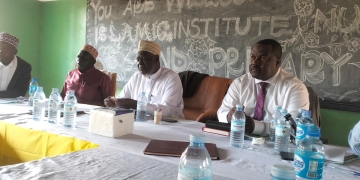 KAMPALA, UGANDA – Dr. Aisha Nakiwala, Head of Journalism and Communications at Makerere University, delivered a comprehensive lecture on the role of media in covering international relations, with a focus on the Israel-Gaza war.
KAMPALA, UGANDA – Dr. Aisha Nakiwala, Head of Journalism and Communications at Makerere University, delivered a comprehensive lecture on the role of media in covering international relations, with a focus on the Israel-Gaza war.
Speaking at a media workshop at Kololo, Dr. Nakiwala emphasized the importance of accurate and nuanced reporting in international relations, particularly in conflicts like the Israel-Gaza war.
Dr. Nakiwala highlighted the need for journalists to understand the complexities of the conflict, including the historical and political context, and to avoid simplistic or biased reporting.
She also emphasized the importance of localized news and awareness of international media agencies’ biases, which can lead to misinformation.
Dr. Nakiwala noted that media has failed to bring up diverse news and faces, such as language, faith, persecution, and manipulation of the media.
She encouraged journalists to report with humanity and balance, and to prioritize the voices and stories of those affected by the conflict.
Dr. Nakiwala also emphasized the importance of cultural sensitivity and understanding in reporting on international conflicts.
She noted that journalists have a responsibility to promote peaceful coexistence and to avoid perpetuating harmful stereotypes or biases. Dr. Nakiwala also highlighted the need for journalists to be aware of their own biases and to strive for objectivity in their reporting.
The workshop also featured addresses from several dignitaries, including Iranian Ambassador to Uganda Majid Saffar, who announced that Iran will not accuse any individual or entity of being responsible for the death of President Ebrahim Raisi. Ambassador Saffar emphasized that Iran is focused on promoting international cooperation and understanding, rather than assigning blame. He appreciated the sympathy from Ugandan leaders and media practitioners and pledged to continue bilateral agreements with African countries, including Uganda.
Dr. Rehema Nakalema, Lecturer at Islamic University in Uganda, presented on Iran’s achievements, including historical and cultural achievements, nuclear technology, and natural resources. The workshop aimed to promote greater understanding and cooperation between Iran and Uganda and to foster a more informed and nuanced public discourse on international relations.
The workshop also provided a platform for journalists to share their experiences and challenges in reporting on international conflicts. Participants discussed the importance of fact-checking, cultural sensitivity, and ethical reporting in covering complex issues like the Israel-Gaza war. The workshop also highlighted the need for journalists to be aware of their own biases and to strive for objectivity in their reporting.
Overall, Dr. Nakiwala’s lecture provided a comprehensive and nuanced understanding of the role of media in covering international relations, particularly in conflicts like the Israel-Gaza war. Her emphasis on accurate and nuanced reporting, cultural sensitivity, and ethical reporting provided valuable insights for journalists and media practitioners in Uganda and beyond. The workshop also highlighted the importance of promoting peaceful coexistence and understanding in reporting on international conflicts, and the need for journalists to be aware of their own biases and to strive for objectivity in their reporting.










